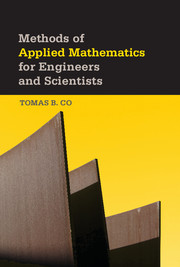Book contents
- Frontmatter
- Contents
- Preface
- I MATRIX THEORY
- III VECTORS AND TENSORS
- III ORDINARY DIFFERENTIAL EQUATIONS
- IV PARTIAL DIFFERENTIAL EQUATIONS
- 10 First-Order Partial Differential Equations and the Method of Characteristics
- 11 Linear Partial Differential Equations
- 12 Integral Transform Methods
- 13 Finite Difference Methods
- 14 Method of Finite Elements
- A Additional Details and Fortification for Chapter 1
- B Additional Details and Fortification for Chapter 2
- C Additional Details and Fortification for Chapter 3
- D Additional Details and Fortification for Chapter 4
- E Additional Details and Fortification for Chapter 5
- F Additional Details and Fortification for Chapter 6
- G Additional Details and Fortification for Chapter 7
- H Additional Details and Fortification for Chapter 8
- I Additional Details and Fortification for Chapter 9
- J Additional Details and Fortification for Chapter 10
- K Additional Details and Fortification for Chapter 11
- L Additional Details and Fortification for Chapter 12
- M Additional Details and Fortification for Chapter 13
- N Additional Details and Fortification for Chapter 14
- Bibliography
- Index
11 - Linear Partial Differential Equations
from IV - PARTIAL DIFFERENTIAL EQUATIONS
Published online by Cambridge University Press: 05 April 2013
- Frontmatter
- Contents
- Preface
- I MATRIX THEORY
- III VECTORS AND TENSORS
- III ORDINARY DIFFERENTIAL EQUATIONS
- IV PARTIAL DIFFERENTIAL EQUATIONS
- 10 First-Order Partial Differential Equations and the Method of Characteristics
- 11 Linear Partial Differential Equations
- 12 Integral Transform Methods
- 13 Finite Difference Methods
- 14 Method of Finite Elements
- A Additional Details and Fortification for Chapter 1
- B Additional Details and Fortification for Chapter 2
- C Additional Details and Fortification for Chapter 3
- D Additional Details and Fortification for Chapter 4
- E Additional Details and Fortification for Chapter 5
- F Additional Details and Fortification for Chapter 6
- G Additional Details and Fortification for Chapter 7
- H Additional Details and Fortification for Chapter 8
- I Additional Details and Fortification for Chapter 9
- J Additional Details and Fortification for Chapter 10
- K Additional Details and Fortification for Chapter 11
- L Additional Details and Fortification for Chapter 12
- M Additional Details and Fortification for Chapter 13
- N Additional Details and Fortification for Chapter 14
- Bibliography
- Index
Summary
In this chapter, we focus on the case of linear partial differential equations. In general, we consider a partial differential equation to be linear if the partial derivatives together with their coefficients can be represented by an operator L such that it satisfies the property that L (αu + βv) = αLu + βLv, where α and β are constants, whereas u and v are two functions of the same set of independent variables. This linearity property allows for superposition of basis solutions to fit the boundary and initial conditions.
We limit our discussion in this chapter to three approaches: operator factorization of reducible linear operators, separation of variables, and similarity transformations. Another set of solution methods known as integral transforms approach are discussed instead in Chapter 12.
The method using operator factorization is described in Section 11.2, and it is applicable to a class of partial differential equations known as reducible differential equations. We show how this approach can be applied to the one-dimensional wave equation to yield the well-known d'Alembert's solutions. In Section K.1 of the appendix, we consider how the d'Alembert solutions can be applied and modified to fit different boundary conditions, including infinite, semi-infinite, and finite spatial domains.
The separation of variables method is described in Section 11.3. It may not be as general at first glance, but it is an important and powerful approach because it has yielded useful solutions to several important linear problems in science and engineering. These include the linear diffusion, wave, and elliptic problems.
- Type
- Chapter
- Information
- Methods of Applied Mathematics for Engineers and Scientists , pp. 405 - 449Publisher: Cambridge University PressPrint publication year: 2013



